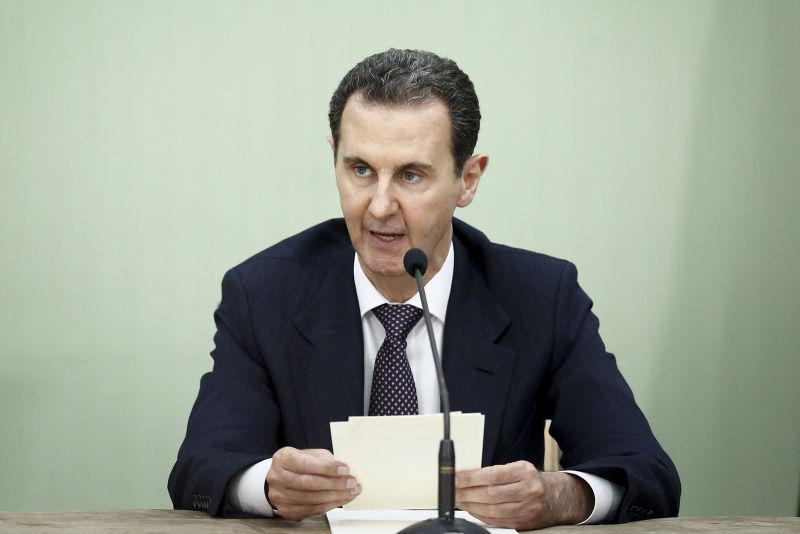Long-suffering Syrians have been rejoicing in the streets after one of the world’s most brutal dictatorships suddenly crumbled in a few short weeks.
For half a century, the Assad family ruled over Syria with an iron fist, with long-documented reports of mass incarceration torture, extra-judicial killings and atrocities against their own people.
A civil war that started during the 2011 Arab Spring ravaged the country and turned it into a breeding ground for extremist group ISIS, while sparking an international proxy war and refugee crisis that saw millions displaced from their homes.
On Sunday, after 13 years of civil war that fractured the country, rebel fighters declared Damacus “liberated” in a video statement on state television, sending Syrian President Bashar al-Assad fleeing to Russia.
Video showed prisoners being freed from Assad’s notorious detention facilities, rebels and civilians were seen ransacking the presidential palace, with footage revealing his luxurious lifestyle and large car collection.
Many in the country are hopeful that Syria could finally be free, but there’s huge uncertainty over what comes next.
Here’s what we know.
What happened?
An armed rebel alliance charged across Syria over 11 days, sweeping through major cities and reigniting a conflict that had been largely static since a 2020 ceasefire agreement.
A new rebel coalition, led by the militant group Hayat Tahrir al-Sham (HTS) launched a surprise attack and took control Syria’s largest city Aleppo on November 30, a seismic move that met little resistance from the Syrian army.
Syrian and Russian jets had targeted rebels in Aleppo and Idlib but opposition forces seized a second major city of Hama and quickly advanced on Homs – the gateway to the capital Damascus.
As Homs fell, rebels encircled and marched into Damascus, declaring Assad overthrown and the city “liberated.”
Who are the rebels?
Syria’s rebel coalition is a new grouping called the “Military Operations Command.” It’s made up of various Islamist and moderate factions who, despite their differences, are united in fighting the Assad regime, ISIS and Iran-backed militias.
They’re led by Abu Mohammad al-Jolani, the head of militant group HTS, a former al Qaeda affiliate in Syria that used to go by the name Al-Nusra Front.
HTS officially cut ties with al Qaeda and has been the de facto ruler in Idlib.
But HTS is only one of numerous armed groups operating in Syria. Other groups controlling territory in the country include the Turkey-backed Syrian National Army and the Kurdish-led Syrian Democratic Forces, elements of which Turkey views as a terrorist organization.
The United States, Turkey, the United Nations and several other Western nations continue to designate HTS as a terrorist organization, and the US has placed a $10 million bounty on Jolani.
In his first public remarks since the rebel-led coup, Jolani declared victory on Sunday for the “entire Islamic nation.”
The rebel leader has sought to diminish the shadow of his extremist roots, and one commander insisted in a state TV address on Sunday that “all sects” would be protected.
But millions of Syrians, including those from minority Christian and other religious communities, remain haunted by a legacy of persecution suffered at the hands of extremist groups like al Qaeda and ISIS.
Who is Bashar al-Assad?
Assad is the second generation of an autocratic family dynasty that held power in Syria for more than five decades.
A former ophthalmologist who studied in London, Assad took power in an unopposed election following the death of his father Hafez al-Assad, who had led the Baath Party since seizing power in 1970.
Like his father, Assad tolerated little dissent and throughout the 13-year civil war, he and his forces have been accused of severe human rights violations and brutal assaults against civilians, with reports of using starvation as a weapon of war, enforced disappearances and killings, and the deliberate bombing of civilian buildings like schools and hospitals.
Among Assad’s worst atrocities was the 2013 sarin gas attack in the city Ghouta, which killed more than 1,400 people and was labeled a war crime by the then-UN Secretary General.
Assad’s notorious detention facilities were black holes where anyone deemed an opponent of the regime disappeared, with widespread reports of torture and inhumane conditions. In 2017, an Amnesty International report claimed as many as 13,000 people had been hanged from 2011 to 2015 at Saydnaya Prison.
Why did this come about and what’s next?
Rebels capitalized on a weakened government whose key allies are heavily preoccupied with other conflicts.
Russia’s grinding war in Ukraine since 2022 has sucked in manpower and resources, leaving little jets and troops for key ally Syria.
Iran has been hamstrung as its war with Israel escalated in the past year. Its main proxy Hezbollah has been decimated by Israeli attacks and airstrikes.
The anti-regime coalition is now disbanding Assad’s military, laying out its vision for a post-Assad Syria.
But experts wonder if the next phase will be a new dawn for a people strangled by a brutal autocracy – or whether sectarianism will bring a different type of authoritarian rule.
US President Joe Biden described the fall of the Assad regime as an “historic opportunity for the long-suffering people of Syria to build a better future” but cautioned it was also a moment of risk and uncertainty in the region.
Iran’s ambassador to Syria Hossein Akbari warned that the fallout from the collapse of Assad’s regime will be beyond American control and could lead to a conflict involving regional countries and Turkey.
Questions are now focused on what a new governing system in Syria would look like, and how it will work given the disparate groups and interests involved, and whether the reordering of power will only lead to further instability.
For now, Syrians across the world are celebrating the stunning and unexpected political turn that caught much of the world off guard.

